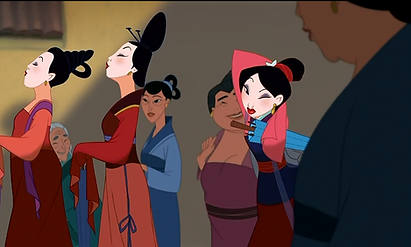

Mulan, the Chinese cross-dresser
Beauty
In this film, beauty is seen as a virtue, but not necessarily one that is necessary. Throughout the film, words describing beauty are used to refer to the virtues of the ideal woman, instead of an actual character.

Throughout the song “Honour to us All”, Mulan is almost literally forced into the body of this ideal woman and she shows clear discomfort with it. This emphasizes to the audience that Mulan is not simply a beautiful thing to be looked at by the male gaze.

As it turns out, pretty does hurt
When Mulan is referred to as beautiful, it is through comparing her to a metaphorical blooming flower.


The nature of these metaphors mean that the beauty Mulan is described with refers to her inner beauty, not her physical appearance. In a nutshell, even if Mulan looks like a world-class supermodel, she is neither an object to be admired nor is she only defined by her beauty.
Passivity
Instead, her value is found in her agency, another diametric contrast to Cinderella. Mulan very quickly resolves to take action to protect her ailing father, even though she knows the consequences of her actions. Her eagerness to do something is not only motivated by her father, but also from her need to find self-worth.


Maybe I didn't go for my father.
Maybe what I really wanted
was to prove I could do things right.
So when I looked in the mirror,
I'd see someone worthwhile.
- It is an honor to protect
my country and my family.
- So, you'll die for honor.
- I will die doing what's right.
Her agency is further accentuated by the fact that she wears a man’s armour to take action, allowing her to take on the male persona and be the active male. However, even after she is stripped off her armour, she is still able to be an active player in her story despite having a female persona.

Mulan: Whether in pants or dresses, she can still kick more ass than you
Therefore, agency is something that women can possess, motivated by others or by one’s needs, regardless of the gender they portray themselves as. However, throughout the film, Mulan only outright states her motivation on one occasion. We can tell her motivation based on her actions, but her motivations are kept secret to everyone else, only being told to a few close friends once, all of whom aren’t even human. This seems to imply that a woman’s agency is limited to how she can support the patriarchy and any personal goals a woman has should be kept secret and are only second priority.

"I actually kinda wanted a character arc in my movie, but please don't tell my dad"
Female Voice in the Patriarchy
Speaking of the patriarchy, in this movie it is clearly represented by the army and government, who are powerful both in the political and physical sense.

Unlike Cinderella, Mulan makes an active choice to access the patriarchy by donning a male persona, not only by wearing armour but also by learning how to “perform” masculinity from Mushu (who admittedly is not the best teacher) and from the training, the ironically named “I’ll Make A Man Out Of You”.



Steps to becoming a man:
1) Get a great outfit
2) Make friends with new people
3) Become a badass
However, while she gains access to the male system, she loses her feminine voice in the process as she cannot communicate feminine aspects of herself to others. While donning her male persona, she is forced into one gender role and cannot embody the other. After she changes out of her armour, she loses the access to patriarchy and only manages to convince a small portion of her friends to help.


“Like so many women who enter ‘the workforce’ or any other ‘male sphere,’ [she] wrestles with the double-binding cultural expectations of choosing between either voice or access, but never both.” (Sells, 1995)
It is not until the end of the film, when she gains both access and retains her feminine voice but she almost immediately severs her access to patriarchy, symbolized by her giving up her phallic symbol. The implication here appears to be that it is extremely difficult for a woman to access the patriarchy and retain her voice and it is not really that worth it.

"Take it! The phallic symbol is too much for me!"
Female Archetypes
The female role of the sex object is deconstructed in this film by showing that it not only forces the woman into an unwilling position, it stifles Mulan’s potential as a person.

"Can I at least take the makeup off now?"
By allowing Mulan to partake is non-traditional roles, she can find her own role, unrestricted by gender norms. By the end, Mulan has become the heroine, possessing traits of both men and women, allowing her to have agency yet retain her feminine voice. This is best established by the final battle, which shows her utilizing a fan, a distinctly non-phallic, feminine tool, and a sword, an obvious phallic symbol, to defeat the leader of the Huns.


“Mulan instigates a definitive breaking away from past paradigms of female heroines -- in this sense, forging a radically new terrain in the conception and depiction of women's roles” (Brocklebank, 2000)
Gender is only a societal construct, and hence one’s sex should not define one’s role in life. However, in the end, Mulan is still subservient to the patriarchy, as shown by her returning to her father (while conveniently ignoring her female relatives) and any goals of her own are secondary compared to her role in the patriarchy.





